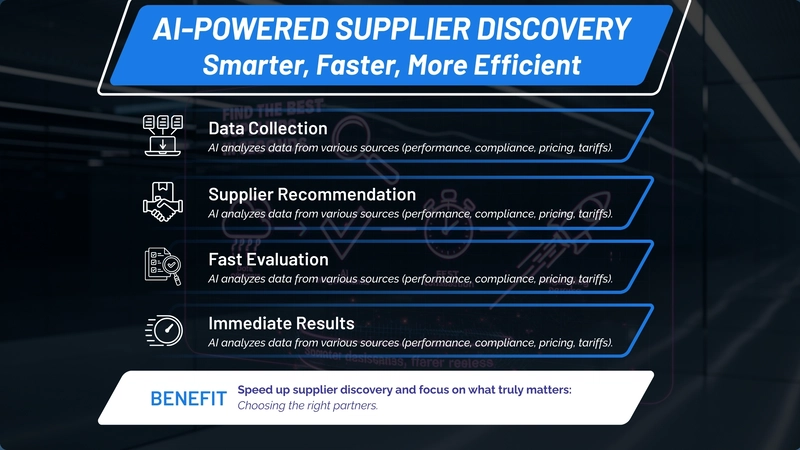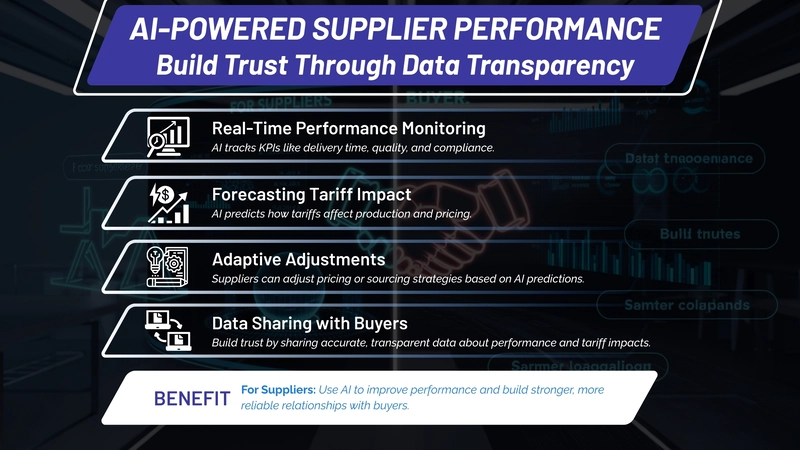
How AI Can Help Your Procurement Team Make Smarter, Faster Decisions
 sambit.jeevaorganic
sambit.jeevaorganicWhat if your procurement team could instantly find the best suppliers, predict market shifts, and...
What if your procurement team could instantly find the best suppliers, predict market shifts, and adapt to tariffs without missing a beat? Sounds like a superpower, right? In a world where global trade policies—like Trump's tariffs—can disrupt your entire supply chain overnight, staying ahead of the curve isn’t just a luxury—it’s a necessity.
Trade tariffs and geopolitical shifts have made procurement riskier than ever. But here's the game-changer: Artificial Intelligence (AI). While others are scrambling to adjust, AI is helping procurement teams make lightning-fast decisions, reducing costly errors, and predicting market trends before they hit.
In this post, we’ll dive into how AI-powered platforms are transforming procurement from a reactive process into a proactive strategy, helping businesses navigate the chaos of tariffs and
The Impact of Global Trade Policies on Procurement
Understanding the Role of Tariffs in Procurement
Global trade policies, particularly tariffs, have far-reaching consequences on procurement strategies. The tariffs imposed by the Trump administration—ranging from duties on steel to products from China—created significant disruption in supply chains. These tariffs increased the cost of imported goods, affecting everything from raw materials to finished products.
tariffs isn’t limited to just price increases. They also influence the availability of goods, supplier selection, and even the reliability of the supply chain. With fluctuating trade barriers and tariff rates, procurement teams need to be agile and responsive, constantly seeking alternative suppliers or adjusting contracts to account for these shifts.
The Need for Faster, Smarter Decisions in an Unpredictable Environment
The unpredictability created by these tariffs has made it clear that procurement teams can no longer rely on traditional supplier evaluation methods alone. Fast, informed decisions are critical to avoid disruptions in supply chains and mitigate additional costs. AI can help procurement teams quickly identify reliable suppliers, assess the potential impact of tariffs on costs, and adjust procurement strategies accordingly.
How AI Reduces the Time Spent on Supplier Evaluation (Buyer’s Perspective)
AI-Powered Supplier Discovery
AI platforms can revolutionize the way procurement teams discover suppliers. Traditional methods of supplier evaluation—like manually sifting through databases or relying on outdated spreadsheets—are time-consuming and prone to errors. AI accelerates this process by analyzing vast amounts of data, including supplier performance, pricing trends, reliability, and compliance standards. AI can then recommend suppliers that best meet a company’s specific needs, including those that are less impacted by changing tariff rates or trade restrictions.
For example, AI can quickly identify suppliers in different regions who can provide similar products at a comparable cost but with fewer tariff-related risks, helping procurement teams make better, faster decisions.
Automated Supplier Qualification
Evaluating suppliers often involves verifying compliance with regulations, reviewing certifications, and assessing financial stability—tasks that require significant time and effort. AI can automate these processes, ensuring that suppliers are qualified based on real-time data. If tariffs affect a supplier’s cost structure, AI can help buyers find alternative sources more quickly.
A practical example: AI can instantly flag a supplier that’s facing increased tariffs on a critical raw material and suggest alternative suppliers whose pricing remains stable or offers more favorable terms, allowing procurement teams to act swiftly and keep costs under control.
Real-Time Data and Insights
AI platforms can deliver actionable insights into supplier performance in real-time. This is especially important in times of volatility caused by tariffs, where procurement teams need to assess supplier stability continuously. By monitoring data from various sources—such as market trends, geopolitical factors, and tariff impacts—AI can help procurement teams predict disruptions before they occur.
Case study: An AI platform may alert a procurement team that a supplier’s price increases are due to an upcoming tariff increase, prompting the team to seek alternatives well before the price hikes take effect.
How AI Improves Data Accuracy and Reduces Human Errors (Buyer’s Perspective)
Automated Data Collection and Integration
One of the most significant advantages of AI in procurement is its ability to automate data collection from various sources. Traditionally, procurement teams rely on manual data entry and fragmented systems, which can lead to inconsistencies and errors. AI platforms, however, integrate data from supplier performance metrics, market trends, and regulatory changes into one unified system, ensuring that all decisions are based on accurate, up-to-date information.
This centralized data collection reduces the chances of human error and ensures that procurement teams are working with the most accurate, comprehensive data available, ultimately leading to better decision-making.
Predictive Analytics
AI platforms can forecast potential disruptions in the supply chain, such as price increases or delays due to tariffs or other geopolitical factors. By analyzing historical data and current market conditions, AI can predict how tariffs might impact the supply chain and suggest strategies to mitigate those impacts.
For example, predictive analytics could identify that a tariff on a particular material will likely increase costs by 15% in the next quarter. With this information, procurement teams can act early to find alternative suppliers, renegotiate contracts, or adjust pricing models to avoid financial strain.
The Supplier’s Role in Adapting to AI for Smarter Decision-Making
AI for Supplier Performance Monitoring
AI isn’t just beneficial for buyers—it can also help suppliers enhance their performance. By using AI to monitor key performance indicators (KPIs), suppliers can identify areas for improvement and optimize their operations. AI tools can track everything from delivery times to quality metrics, helping suppliers become more competitive and reliable.
For procurement teams, this means better access to data about a supplier’s consistency, quality, and adherence to deadlines. Suppliers who use AI to improve these factors will be better positioned to maintain strong relationships with their buyers.
Supplier Adaptation to Global Market Changes
Tariff changes and trade disruptions aren’t just challenges for buyers; they also affect suppliers. AI can help suppliers adapt to these changes by forecasting the impact of new tariffs on production costs or raw material pricing. Suppliers can use this information to adjust their pricing models or seek cost-saving alternatives to mitigate the impact.
For example, a supplier that uses AI to track the impact of tariffs on imported materials can adjust its prices or find alternative sourcing methods, ensuring that they remain competitive despite shifting trade policies.
Building Trust Through Data Transparency
Transparency is essential for building strong relationships between buyers and suppliers. AI can provide real-time data on pricing, production schedules, and tariff impacts, allowing both parties to make decisions based on shared, reliable data. This transparency fosters trust and encourages long-term collaboration.
For instance, suppliers who share data on how tariffs are affecting their operations can strengthen their relationship with buyers, making them more likely to collaborate on future projects.
The Future of Procurement in the Age of AI and Tariffs
- AI and the Long-Term Adaptability of Procurement Strategies
As global trade dynamics continue to evolve, businesses that adopt AI will be better positioned to navigate changes like tariffs, sanctions, or supply chain disruptions. AI’s ability to analyze vast amounts of data and provide actionable insights allows procurement teams to adapt quickly to changing conditions. In the long term, AI will help businesses build more flexible and adaptive procurement strategies that can withstand external shocks.
- AI in Building Agile, Resilient Supply Chains
AI is helping businesses build more resilient supply chains by providing tools for scenario planning and risk mitigation. By analyzing historical data, current market trends, and external factors such as tariffs, AI can help procurement teams develop contingency plans and build agility into their operations. This enables both buyers and suppliers to respond quickly and effectively to sudden shifts in the market.
Conclusion:
In an increasingly unpredictable global market, AI is helping procurement teams make faster, smarter decisions. By automating supplier evaluations, providing real-time insights, and improving data accuracy, AI platforms are empowering businesses to navigate the complexities created by global trade policies, including tariffs. For companies looking to stay ahead of the curve, integrating AI into procurement strategies is not just a competitive advantage—it's a necessity.
If you're ready to make smarter decisions and build a more resilient procurement strategy, it's time to explore the power of AI.

